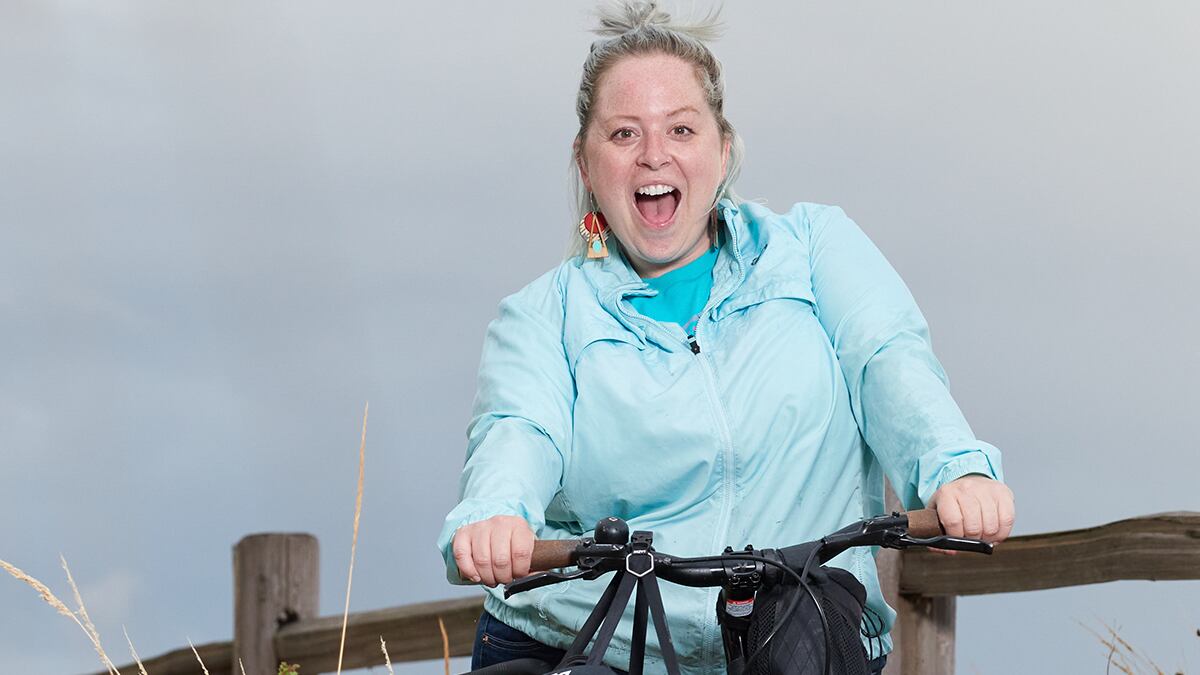If you’ve ever ridden a bike, you might’ve laughed at a certain viral TikTok video featuring queer pop singer-songwriter Be Steadwell as she speak-sings, with performative solemnity, about white men on bikes: “White men on bikes, they’re important. They got outfits, like in a race. You’re existing in their way.”
The video’s gained 97,500 likes and 18,000 shares, and for good reason: Add “thin” to these descriptors, and you get a fairly accurate distillation of the cycling world’s retrograde tendency to prioritize white, male, cisgender athletes to the detriment of everybody else. This lopsided dynamic impacts everything from historic pay inequities in racing to gear that only fits a narrow range of sizes to the drawn-out, disintegration that was the women’s Tour de France.
Two Northwest cyclists, Marley Blonsky and Kailey Kornhauser, are changing that—or at least part of it. One bike trip at a time, one training at a time, they’re advocating to make cycling communities more size inclusive, to acknowledge the existence and validity of fat athletes, and to challenge limited ideas of what someone who bikes should look like.
The two joined forces after initially connecting on Instagram. After sharing the observation that size inclusion wasn’t really being addressed within the cycling world, they started doing outreach within bike communities through trainings, partnerships, and size-inclusive consulting.
Kornhauser has even appeared on the cover of Cycling magazine and wrote an accompanying essay, “I’m a Fat Cyclist—And I Don’t Need to ‘Fix’ My Body,” arguing powerfully for a changed cycling world in which “all people, not just fat people, accept that our idea of athleticism is flawed.”
Kornhauser and Blonksy’s advocacy seems to be gaining ground. On Aug. 29, the Oregon Short Film Festival awarded Best Documentary Film to All Bodies on Bikes—a documentary directed by Zeppelin Zeerip about the two cyclists and their work.
In just over 13 minutes, All Bodies on Bikes examines the complexity of body image and interrogates the way anti-fatness manifests in cycling through the types of messaging so aptly described on Steadwell’s TikTok video.
Both Kornhauser and Blonksy come off as direct, emphatic and funny, as when Kornhauser introduces herself: “I’m Kailey Kornhauser. I’m a Ph.D. student at OSU. I ride bikes. And I’m fat. Those are some facts about me.”
But both are also clear-eyed about how a culture of anti-fatness harms people in larger bodies. Kornhauser describes a nutritionist unhelpfully telling her to eat fewer apples as a child, and Blonsky identifies a lack of visibility for fat athletes that holds people back from biking. “For a long time I wasn’t seeing anyone that looked like me doing the types of biking I was doing,” she says.
All Bodies on Bikes is revolutionary in the way any sensitive acknowledgment of size inclusivity in sports is revolutionary. It features a shot of Kornhauser cruising through ferns and old growth on her mountain bike, confident and strong. Even when she wipes out at one point, she triumphantly gets up, dusts off her hands, and says falling makes her feel like “a real mountain biker.”
In a very literal sense, the film is a way for Blonsky and Kornhauser to embody the visibility they’ve found lacking within their own cycling experiences. Seeing them in action is an instant rebuttal to limited thinking that suggests people in larger bodies can’t enjoy sport for its own sake, but must do so as punishment, or only once they’re thinner.
Or as Kornhauser puts it: “I’m not out here to fix my body or make it look a certain way…the primary reason that we go is to have fun.”
And it does look fun. All Bodies on Bikes may focus on Kornhauser and Blonsky’s advocacy, but it also captures a different milestone: their first bike trip together.
That’s right. Despite their collaboration, Blonsky, who’s based in Seattle, and Kornhauser in Corvallis hadn’t actually ridden together until this year. All Bodies on Bikes documents their first bike camping trip together on the Corvallis-to-the-Sea Trail, as they dance to Meghan Thee Stallion and tame 7,500 feet of elevation on the way to a triumphant dip in the Pacific.
“I want people to feel empowered that they can ride a bike wherever they want to go,” Blonsky says in the film’s joyful coda. “I think there is about to be a really big movement happening, and it’s really exciting because fat people? We’re done hiding.”
That “really big movement” is one Blonsky and Kornhauser are instigating themselves. In Seattle, Blonsky co-organizes Moxie Monday, a cycling series just for women, nonbinary, trans and femme cyclists. The social, no-drop rides—rides where no one is left behind—build community among riders who aren’t thin white men on bikes, and send a clear message that if you want to bike, you should, regardless of social messaging that might suggest otherwise.
There’s only one situation where this doesn’t apply: smoke season. In that scenario, says Blonsky, “my best advice is to take your workout indoors.”
